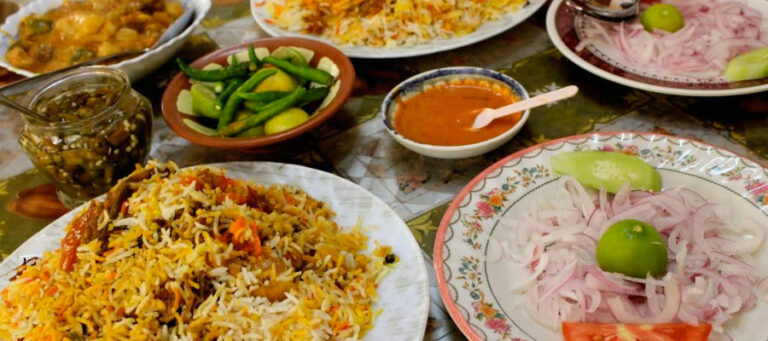Introduction: Omani Cuisine Overview
Omani cuisine is a mix of different influences, including Arab, African, and Indian cultures. It is known for its simplicity and use of fresh ingredients, such as fish, meat, and vegetables. The cuisine also heavily features spices like cumin, coriander, and turmeric. Omani food is often served with rice, which is a staple in the country.
Importance of Dates in Omani Cooking
Dates are an essential ingredient in Omani cuisine. They are used in both sweet and savory dishes, providing a natural sweetness and a chewy texture. Dates are often eaten as a snack in Oman and are used to break the fast during Ramadan. They are also used in traditional Omani dishes such as shuwa, a slow-roasted spiced lamb, and harees, a porridge made with wheat and meat.
Traditional Rice Dishes in Oman
Rice is a staple in Omani cuisine and is often served with meat, fish, or vegetables. Two popular rice dishes in Oman are biryani and machboos. Biryani is a spiced rice dish that is layered with meat or vegetables and cooked with caramelized onions and saffron. Machboos is similar to biryani but is made with a different blend of spices and is often served with fish.
The Role of Rice in Omani Cuisine
Rice is a crucial part of Omani cuisine, serving as a base for many dishes. It is often flavored with spices and aromatic herbs like thyme and rosemary. Rice is also used to make desserts such as muhalabiya, a rice pudding flavored with rosewater and topped with pistachios. In addition to being a staple food, rice is also a symbol of hospitality in Omani culture, and guests are often served rice dishes as a sign of respect.
Popular Date-Based Omani Desserts
Dates are a popular ingredient in Omani desserts, adding natural sweetness and a chewy texture. One famous Omani dessert is halwa, a sticky-sweet confection made with semolina, sugar, and ghee, and flavored with rosewater and cardamom. Another traditional dessert is madrouba, a sweet porridge made with dates and rice. Dates are also used in making ma’amoul, a filled cookie typically eaten during Eid al-Fitr, the Muslim holiday that marks the end of Ramadan.
Conclusion: Omani Cuisine and Cultural Significance
Omani cuisine is a reflection of the country’s rich history and diverse cultural influences. The use of dates and rice in Omani cooking is a testament to the country’s agricultural heritage and the importance of hospitality in Omani culture. Whether it’s a savory rice dish or a sweet date-based dessert, Omani cuisine is a testament to the country’s culinary traditions and cultural significance.

